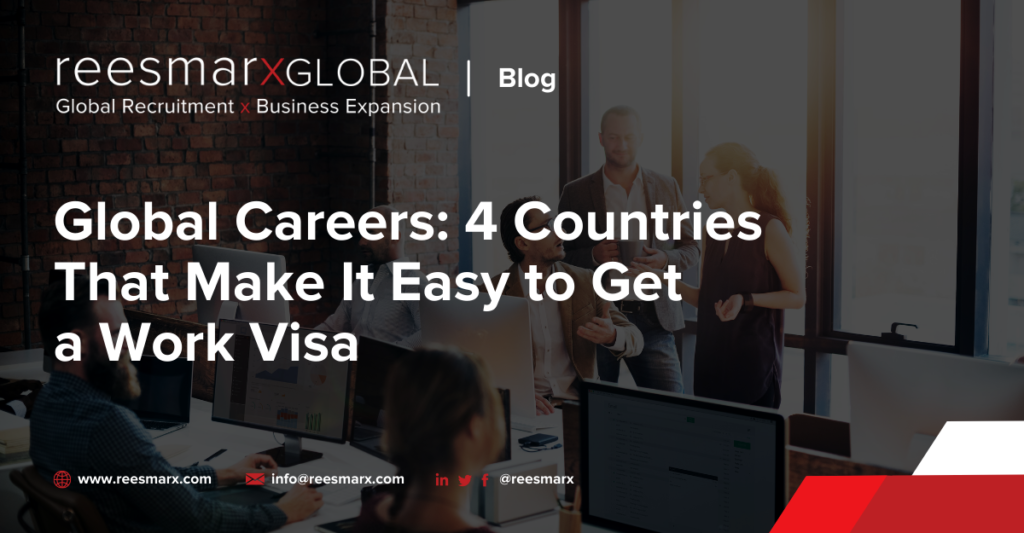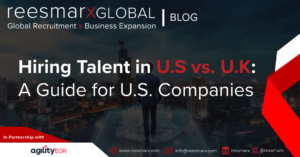When the United States announced restrictions to the H-1B, H-1B1 and other professional work visas, the results were damaging particularly to the technology industry, that relies on highly skilled foreign workers, programmers and software developers.
The repercussions were felt to the extent that global software companies like Facebook became highly vocal of the move. It was referred to as a ‘brain drain’ for America’s leading technology hub in Silicon Valley.
While some countries are becoming more restrictive in terms of issuance of short and long-term work visas, other nations are lowering the requirements in an effort to increase talent acquisition and small business investment.
If you are looking internationally for your next career opportunity, consider the top seven countries who are actively recruiting technology professionals, finance, executive management and other competitive career roles.
General Qualifications for International Work Visas
Before you start searching for a new career opportunity in a foreign country, it’s important that you understand the general qualifications that are required for work visa issuance. The criteria required to apply successfully for a work visa includes educational credentials, criminal record abstract and in some cases, financial benchmarks or investment requirements.
Some of the general qualifications may include:
- No prior criminal offenses. Some countries limit this to serious offenses such as felony crime instances, but others are can be strict include misdemeanor charges on record. Pending warrants for fines can also negate a work visa request in most countries.
- A valid passport.
- Minimum educational requirements of 3-4 years of post secondary education, and the successful completion of a degree in the competitive or targeted fields of practice. This always includes technology and IT, and may include healthcare and finance sector professionals, as well as small business owners and entrepreneurs.
- Students may acquire a work and study visa if they are enrolled with an educational institution within the foreign country. However, the work visa becomes nullified when the student finished their academic program, and another application for temporary residency is required to remain in the country.
- In some countries, a personal bankruptcy may be enough to nullify the request for a work visa. Financial stability weighs heavily as part of the selection criteria, and some countries require proof of liquid assets (savings) before permitting an individual to work or live within the country.
- If you are currently in the immigration application process for the country that you would like to work in, you may not be permitted to apply for a work visa. Once you are in landed resident process, you are required (by many countries) to wait until you have been given status, before you can work within the country. Many people choose to apply for a work visa to experience living and working in the foreign country, before starting the immigration process.
If none of those circumstances applies to you, there may be an opportunity to apply for a work visa with a choice international country, to pursue lucrative career options and enhance your CV with global business experience. Something that is highly valued by corporate employers, which can improve your career advancement opportunities.
Four Countries That Make It Easy to Get a Work Visa
Global economies and demographics vary, and in some countries, an aging workforce combined with a low population of STEM workers requires a robust immigration and work visa policy to attract experienced and skilled workers.
Whether you plan to immigrate to the host country, or simply wish to work abroad to enhance your international business experience, these four countries offer a variety of benefits and a simplified work visa application process for foreign professionals.
1. The Netherlands
Are you an entrepreneur, and have a lucrative start-up business idea? The Netherlands is actively recruiting technology professionals and small business owners, with a streamlined process that makes it easy to work and live there.
The Dutch American Friendship Treaty (DAFT) is a program that encourages small business owners and self-employed professionals to work and live in Amsterdam, Rotterdam and other technology hub cities. The country also has a robust support program for foreign entrepreneurs, that provides mentorship and other services to launch new business enterprises within the country.
In the summer of 2019, employers in The Netherlands posted almost 300,000 technology job vacancies. The country is viewed as a high growth opportunity for IT professionals, including programmers and code writers, internet security workers, and other roles within the tech sector.
2. Ireland
Unlike other countries that limit the age of professional candidates for work visas, Ireland does not have any age restrictions. To qualify for a one-year Working Holiday Authorization, the professional must be enrolled in an undergraduate or graduate educational program. Recent graduates (within one-year post-graduation) are also accepted for work visas by Ireland.
General work permits are also available for those that do not meet the educational enrollment requirements but are more difficult to acquire. They are granted based on skill set; industry of expertise and the candidate is required to prove that their unique skills are required by an Irish employer.
3. Australia and New Zealand
Both Australia and New Zealand authorize a one-year work permit to foreign citizens who are between the ages of 18 and 30 years. However, Australia governance requires that foreign workers complete a maximum of six months employment with each employer. Engineering graduates and IT professionals can fast-track their work visa issuance by passing a skills assessment.
4. Germany
Are you a career professional in a creative field, such as art, writing, graphic design or visual marketing? You may qualify for an Artist Visa, which is tailored to help freelancing professionals establish residency in Germany for self-employment. Application fees are required, as well as proof of health insurance, income statements and other documentation.
Professionals also have the option of applying for a Germany Long-Stay Visa. The criteria for this visa require that you have a job offer from a German employer. If you are sponsored with a career opportunity by an employer in Germany, you must also meet the ‘Act on Residence’ requirements which include:
- Highly qualified foreigners that are skilled in areas of technical knowledge and research.
- Scientific researchers, and teachers in high or prominent positions of tenure and experience.
- Corporate managers and executive leaders.
It is important to note that only residents of specific developed countries are permitted to apply for a Germany Long-Stay Visa. Those countries include EEA / EU members, Canada, the United States, Israel, Japan, New Zealand, Australia, Switzerland and the Republic of Korea.
Next Steps? Apply Early for Your Work Permit or Visa
If you plan to work and live in a foreign country, remember that a tourist visa cannot be transferred into a work visa. It is important to apply early through the local consulate and receive approval before you move to the host country.
Be careful and make note of the terms, conditions and limitations of your issued work visa, and comply with all legal requirements. In some countries, this can mean leaving after a specific term and then reapplying for a new work permit. If you outstay your authorized visa, it can result in fines, legal complications and negatively impact your qualification for landed resident status, should you decide to immigrate permanently to the country.






